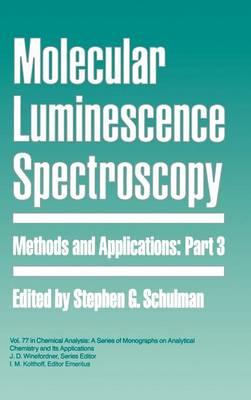Overview
Over the past three decades, luminescence spectroscopy has transcended its origins as a curiosity in the physical laboratory to become a widely used and respected staple of the analytical chemist's instrumentation arsenal. Fluorescence, chemiluminescence, and phosphorescence spectroscopies are now routinely applied to such real analytical problems as the quantitaion, qualitative identification, and structural characterization of organic and inorganic compounds and even of cellular structures. And the list of recent advances in analytical applications of luminescence spectroscopy keeps growing. The earlier volumes of Molecular Luminescence Spectroscopy provided professional chemists with a detailed, exhaustive, and up-to-date look at the applications of fluorescence, phosphorescence, and chemiluminescence spectra to the analysis of organic and inorganic compounds. Presenting topics never available in any analytical text, such as excited state optical activity and bioinorganic luminescence spectroscopy, the volumes represented a significant advance in the chemical literature. Part 3 continues the book's always current and practical examination of the field’s newest innovative turns. In a clear, systematic format, Part 3 discusses such widespread or ascendant laboratory techniques as: photochemically generated fluorophores fluorescent probes luminescence from bile salt aggregates hole-burning spectroscopy laser-excited microspectro-fluorometry near-infrared luminescence spectroscopy Other topics such as the fluorescence and phosphorescence of pharmaceuticals and natural products have never been reviewed as exhaustively before. The chapters on fluorescence detection in chromatography and luminescence immunoassay are the most up-to-date treatments available on these subjects. Invaluable to analytical chemists, instructors, and students, Molecular Luminescence Spectroscopy, Part 3 offers expert guidance on the practical specifics of this multi-faceted technique as well as its farreaching analytical possibilities.
Full Product Details
Author: Stephen G. Schulman (University of Florida, Gainesville) ,
James D. Winefordner (University of Florida) ,
I. M. Kolthoff (University of Minnesota)
Publisher: John Wiley & Sons Inc
Imprint: Wiley-Interscience
Volume: 77, Pt. 3
Dimensions:
Width: 16.00cm
, Height: 3.00cm
, Length: 23.60cm
Weight: 0.794kg
ISBN: 9780471515807
ISBN 10: 0471515809
Pages: 480
Publication Date: 20 April 1993
Audience:
College/higher education
,
Professional and scholarly
,
Postgraduate, Research & Scholarly
,
Professional & Vocational
Format: Hardback
Publisher's Status: Active
Availability: Out of stock

The supplier is temporarily out of stock of this item. It will be ordered for you on backorder and shipped when it becomes available.
Author Information
About the editor STEPHEN G. SCHULMAN is Professor of Pharmacy and Chemistry at the College of Pharmacy, University of Florida. A widely known authority on the subject of phototropic equilibrium in electronically excited states, he has written over one hundred papers in the areas of excited state chemistry and molecular luminescence spectroscopy. He is also the editor of Molecular Luminescence Spectroscopy: Methods and Applications, Parts 1 and 2. He received a PhD in analytical chemistry from the University of Arizona.




